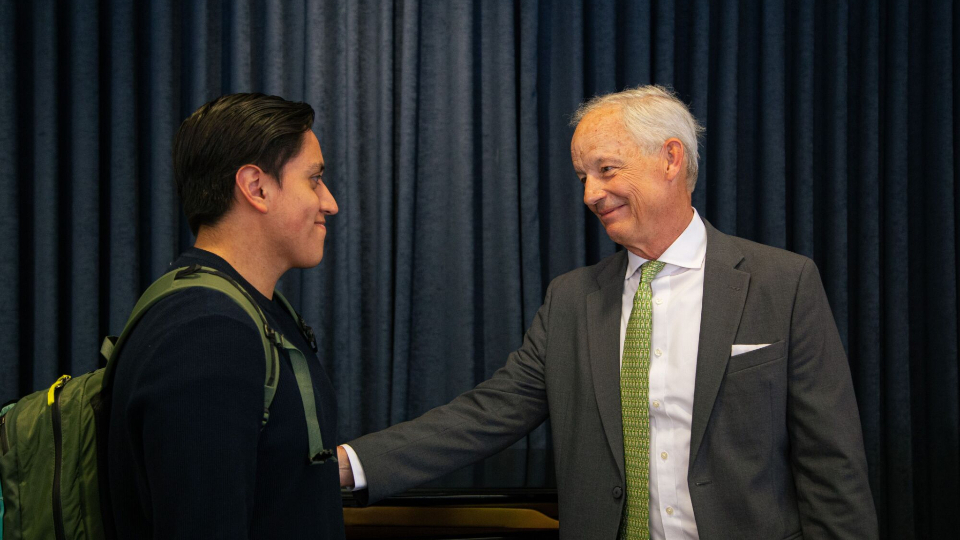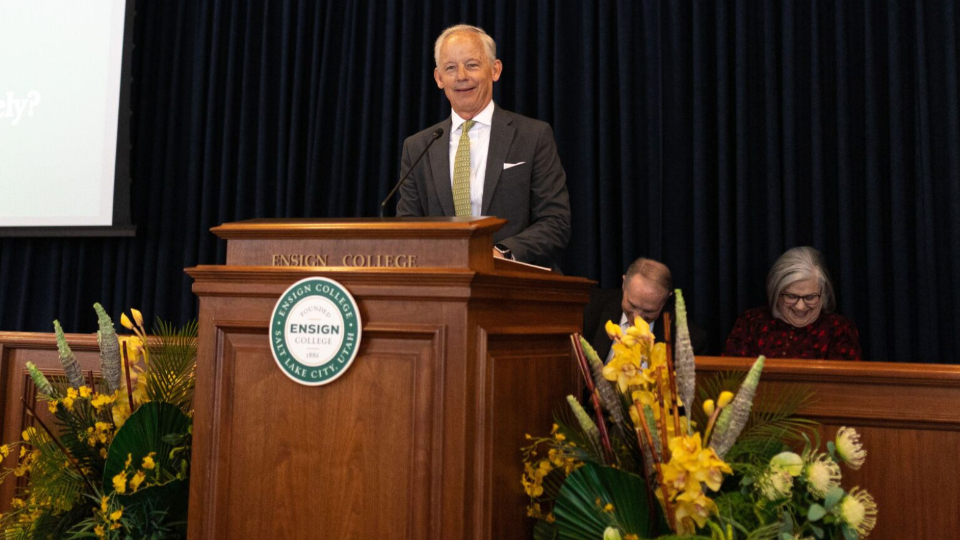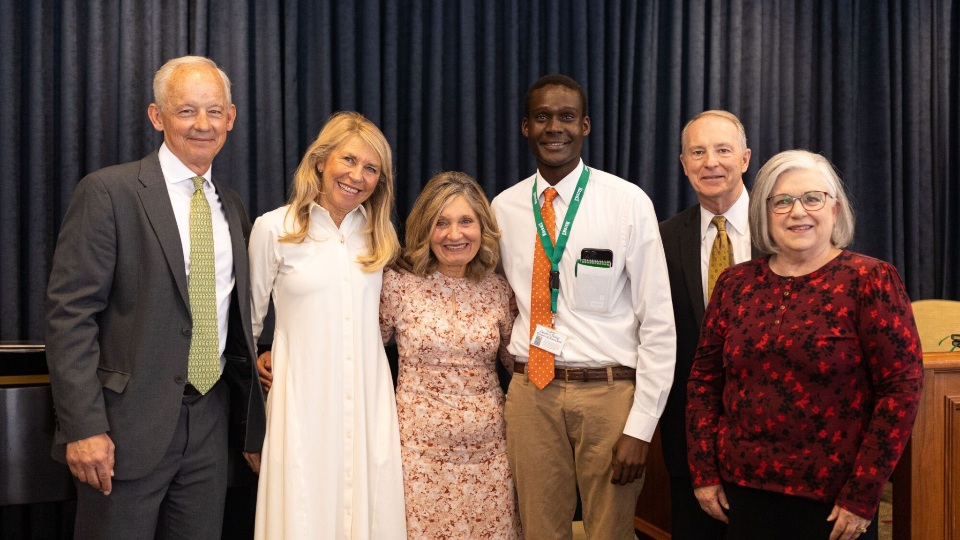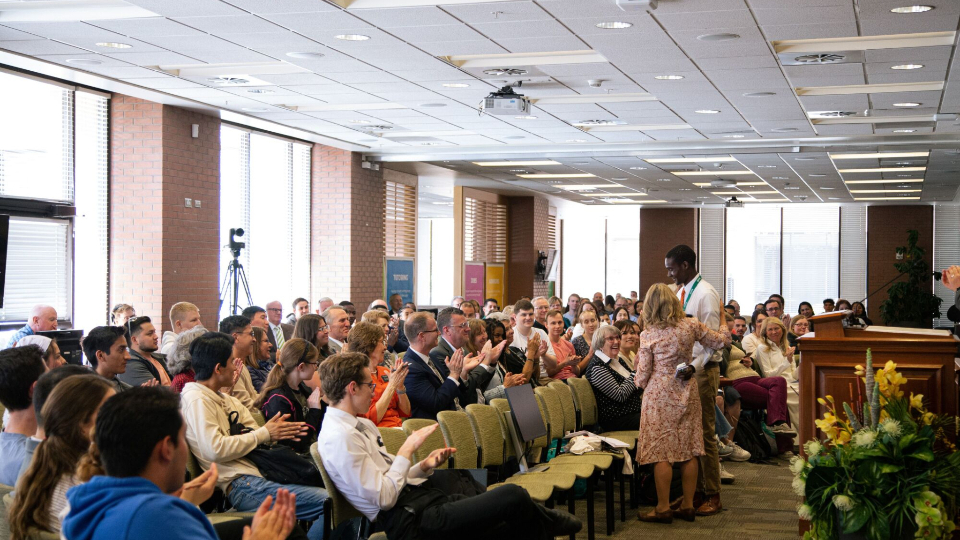
Dunn-Ensign
Elder Michael A. Dunn, a General Authority Seventy, speaks with a student after an Ensign College devotional in Salt Lake City, Utah, on Tuesday, May 9, 2023. Photo by Camila Caraveo, Ensign College, courtesy of Church News.2023 by Intellectual Reserve, Inc. All rights reserved.
This story appears here courtesy of TheChurchNews.com. It is not for use by other media.
By Joel Randall, Church News
On September 30, 1927, George Herman Ruth — commonly known as “Babe Ruth” — hit a record-breaking 60th home run of the year.
“And yet, Babe Ruth could rightly also be considered the most ‘unlikely’ hero of the 20th century, despite these really lofty accomplishments.” said Elder Michael A. Dunn, a General Authority Seventy of The Church of Jesus Christ of Latter-day Saints.

Dunn-Ensign
Elder Michael A. Dunn, a General Authority Seventy, speaks at an Ensign College devotional in Salt Lake City, Utah, on Tuesday, May 9, 2023. Photo by Camila Caraveo, Ensign College, courtesy of Church News.2023 by Intellectual Reserve, Inc. All rights reserved.
Ruth was born to immigrant parents, he often skipped school and looked for trouble as a kid, and his mother died from tuberculosis. He was even deemed “incorrigible,” or “bad and impossible to change or improve,” and sent to St. Mary’s Industrial School for Boys, a Catholic orphanage for runaways and delinquents.
So, what changed?
The baseball icon had the help of a man known as Brother Mathias. Mathias was a priest at the orphanage who paid attention to Ruth, played baseball with him and eventually realized his skill at the sport. Many years later, Ruth’s daughter said, “When Babe was 23 years old, the whole world loved him. When he was 13 years old, only Brother Matthias loved him.”
Elder Dunn said, “I’m comforted that our very just and very merciful God promises that ‘the last shall be first’ (Doctrine and Covenants 29:30) in a very unique and divine reordering of probabilities, unfairnesses and even disadvantages. ... God’s power is both within us and very much within our reach.”
On Tuesday, May 9, Elder Dunn spoke in a devotional to students and staff members at Ensign College. His message highlighted that through work, determination and God’s help, students can accomplish the seemingly impossible.
Accomplishing the Impossible
Elder Dunn quoted Church President Russell M. Nelson in saying, “The Lord uses the unlikely to accomplish the impossible.”

Dunn-Ensign
Christopher Dzowa (third from right), a student from Malawi, stands with Rhonda Rose (third from left), a senior missionary who helped him start college; Elder Michael A. Dunn (first from left) and his wife, Linda; and Ensign College President Bruce C. Kusch (second from right) and his wife, Alynda, at an Ensign College devotional in Salt Lake City, Utah, on Tuesday, May 9, 2023. Photo by Camila Caraveo, Ensign College, courtesy of Church News.All rights reserved.
“The good news,” said Elder Dunn, “is that if you are a self-identified ‘unlikely,’ a prophet of God has declared we have the potential to accomplish some incredible — make that impossible — things in our lives.”
For students, these impossible tasks could include being the first in the family to attend college, thriving in a single-parent or no-parent home, overcoming abuse, learning English as a second language, paying tuition, overcoming anxiety or depression, and more.
But despite all these possible circumstances, said Elder Dunn, students can find strength to overcome challenges and become unlikely heroes. This power comes from being “anxiously engaged in a good cause” (Doctrine and Covenants 58:27), like self-improvement. It comes from looking around to see the persons the Lord puts in the path. It comes from finding God’s grace and divine power.
Finding divine power, however, will be different for each person and circumstance.

Dunn-Ensign
Ensign College students and faculty applaud Christopher Dzowa — a student from Malawi — and Rhonda Rose, a senior missionary who helped him start college, at a devotional in Salt Lake City, Utah, on Tuesday, May 9, 2023. Photo by Camila Caraveo, Ensign College, courtesy of Church News. All rights reserved.
“As relatively young people yourselves, how will you achieve your impossible?” asked Elder Dunn. “I don’t exactly know. But I do know that God does know. And I am assured that ‘with God nothing [is] impossible’ (Luke 1:37).”
Overcoming the impossible, he said, requires faith paired with humility. Finding God’s strength “will require every ounce of patience, diligence and hard work we can muster. And, hard as all that sounds, we are to do it joyfully.”
Dzowa’s Journey Through the Impossible
As president of the South Africa Johannesburg Mission from 2014 to 2017, Elder Dunn met Christopher Dzowa, a young man raised in the poverty-stricken country of Malawi. Only 8 years old when his mother died, Dzowa and his brother started sifting for sand in the brutal Malawian sun then selling it to homebuilders.
The pennies from this work were barely enough to feed them, and Dzowa “sensed he personally had something of much importance to offer the world,” said Elder Dunn. “But he also knew that this path that he was on right now was not the way to lead him there.”
One day, Dzowa ran into two Latter-day Saint missionaries, and although he couldn’t understand their language, he could feel a gentle power. He decided to learn English and the gospel and was eventually baptized. A few years later, he was called as a missionary to South Africa.
In the South Africa Missionary Training Center, Dzowa was given a patriarchal blessing that focused on formal education he would receive. “I felt like he had given me the wrong blessing,” Dzowa later said, according to Elder Dunn. “The blessing was true. ... But it was not meant for me.”
After his mission, Dzowa worked as a security guard back in Malawi for 30 dollars a month, not enough to live on. So, he sought out the impossible: applying to Brigham Young University–Idaho, thousands of miles away. He took the English proficiency test three times, and although his score improved each time, he failed all three attempts.
Dzowa pleaded with God for direction, and he received the impression to start with an associate degree at Ensign College. With help from a crowdsourced funding effort and Jack and Rhonda Rose — a senior couple in the Zambia Lusaka Mission — “that unlikely man is here today as one of your cohorts, one of your classmates,” said Elder Dunn to the congregation.
“You are anything but unlikely.”
Copyright 2023 Deseret News Publishing Company.